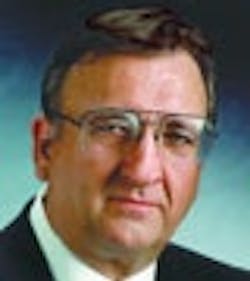America's secret automation think tank
A SECRET society lurks in Ann Arbor, Mich., with a regional office in Washington, D.C., where it can deal with government agencies and testify before committees. It's the National Center for Manufacturing Sciences, a virtually unknown organization that quietly arranges collaborative partnerships among businesses, government and academia.
NCMS and its member companies do really nifty things, such as applying manufacturing techniques to U.S. Department of Defense (DoD) maintenance procedures to save the government $2.2 million and 5,000 hours of labor. The center’s Enhanced Wiring Integrity System (EWIS) project saved the U.S. Air Force more than 9,000 hours and $269,000 in its first six months. And then there’s the Hydrogen Project, in which NCMS is working with the U.S. Department of Energy (DoE) to develop manufacturing technologies for affordable hydrogen-powered energy systems, including fuel cell components and hydrogen storage systems.
NCMS also holds technical conferences, such as the 2006 Commercial Technologies for Maintenance Activities (CTMA) symposium in February, and the Joint AMT-NCMS Manufacturing Technology Forum being held this month (April 2006).
I say NCMS is a secret society because nobody seems to know about it, other than its 130 NCMS member companies, the government, and academia. If you search Google for "National Center for Manufacturing Sciences," you’ll get 63,000 hits, most referring to NCMS’ web site. Press coverage is almost nonexistent. I scanned some of the major publications covering our industry, and found very few citing it.
In spite of this, NCMS seems to be flourishing quite nicely, and has found a niche as America's Secret Automation Think Tank. So here's how to solve global warming, our dependence on foreign oil, and the loss of our jobs: turn these problems over to NCMS.
DoE could ask NCMS, for example, “How can we spend $1 trillion dollars (the cost of conforming to the Kyoto Treaty by some estimates) most effectively, not bankrupt the country, and put people to work?
Dick Morley, CONTROL columnist, father of the programmable logic controller, and NCMS board chairman, says the center probably wouldn’t be asked to take on such a project. “It’s not our scope,” he says. “We’re interested in improving manufacturing and processing to keep jobs and technology in the good ol’ U. S. of A.”
That’s too bad. I’d like to see what NCMS would say about this idea: let’s spend the $1 trillion on 1,000 nuclear plants, site them on abandoned military bases, which are in secure locations and have no “not in my backyard” (NIMBY) problems, and phase out all our fossil-fuel-fired power plants. This would severely cut our dependence on foreign oil, result in thousands of new jobs, and provide the power needed for electric cars.
For us, in particular, it would create 50,000 or more jobs for control engineers, operators and technicians.
NCMS is probably the only independent think tank in the country that could tackle such an idea. Everybody else is too politically correct or has too many vested interests in other technologies to render a balanced, educated and technically correct judgment about our energy, global-warming, and oil-dependency problems.
Whatever NCMS came up with would be far better than our current solutions, which have us lurching from here to there, following the political winds. Even if NCMS can’t solve these problems, it’s still looking out for our interests, and trying to keep automation jobs here. It may be the only organization doing so. Therefore, it deserves your respect and support.
Find out if your company is a member of NCMS. If not, suggest joining to your boss. Morley says NCMS is constantly finding collaborations between companies that create work, identifying new products, and generating contracts for its partners. “An affiliation with NCMS and participation in efforts such as the hydrogen, maintenance, or similar projects can be profitable to your company, as well as the country,” he says.


